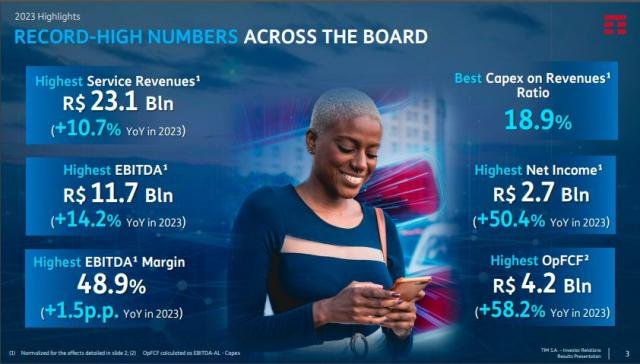TIM Brazil, the telecommunications giant, has revealed a decrease in Capital Expenditure (Capex) for the fourth quarter of 2023 (4Q23), with notable impacts on various operational aspects.
 TIM Brazil’s Capex totaled R$1,292 million in 4Q23, marking a decline of 6.1 percent. The reduction in Capex was attributed primarily to decreased investments in network infrastructure compared to the same period in 2022 (4Q22).
TIM Brazil’s Capex totaled R$1,292 million in 4Q23, marking a decline of 6.1 percent. The reduction in Capex was attributed primarily to decreased investments in network infrastructure compared to the same period in 2022 (4Q22).
Consequently, the Capex over revenue ratio for 4Q23 stood at 20.6 percent, down from 23.4 percent recorded in 4Q22, indicating a decline of 2.8 percentage points. The company attributed this decline to the efficiency brought about by the adoption of 5G technology, showcasing a year-over-year reduction in Capex by 4.8 percent for the entirety of 2023.
In terms of subscriber base, TIM Brazil reported significant growth, particularly in the 5G segment, which reached 5.207 million subscribers by the end of December 2023. Additionally, the company boasted a robust 4G subscriber base of 52.78 million for the same period.
Notably, TIM Brazil recorded 719,000 Fiber-to-the-Home (FTTH) customers and 84,000 Fiber-to-the-Curb (FTC) customers by the end of 2023. However, the overall mobile lines declined by 2.0 percent, reaching 61.2 million, attributed to a shift in customer preferences towards Postpaid plans, which grew by 1.4 percent, while Prepaid lines experienced a decrease of 4.6 percent.
Furthermore, TIM Brazil witnessed a surge in Machine-to-Machine (M2M) connections, which reached 5.0 million lines, marking a substantial increase of 16.4 percent.
TIM Brazil reported a 6.8 percent increase in revenue for 4Q23, totaling R$6,275 million. This growth was primarily driven by a 7.6 percent increase in mobile service revenue, supported by consistent performances in both prepaid and postpaid segments. Moreover, broadband service revenue from TIM UltraFibra surged by 9.5 percent.
However, product revenues experienced a decline of 2.0 percent, reflecting the company’s strategic shift towards diversification and a focus on higher-end segments.
Looking at the broader picture for 2023, TIM Brazil reported an impressive revenue growth of 10.6 percent, with mobile service revenue rising by 11.1 percent. This growth was attributed to various factors including Average Revenue Per User (ARPU) expansion, customer migration to higher-value plans, enhanced customer experience, and revenue contributions from customers acquired from Oi Mobile.
Speaking of ARPU, TIM Brazil achieved its highest Mobile ARPU in its recent history, reaching R$31.1, marking an increase of 15.8 percent. Prepaid ARPU also saw a significant growth of 14.5 percent, reaching R$15.6 in 2023.
In conclusion, TIM Brazil’s financial report for 4Q23 and 2023 showcases a mixed bag of operational challenges and successes, with a notable emphasis on the expansion of 5G technology, revenue growth, and strategic investments in fiber infrastructure.
Baburajan Kizhakedath
